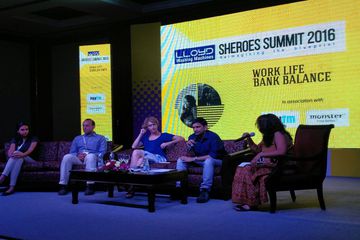Future Of Work: SHEROES SUMMIT 2016
This power-packed session had Kashyap Deorah, entrepreneur and investor; Bee Rowlatt, writer and journalist; Prukalpa Sankar, co-founder, SocialCops, and Apoorv Jain, VP Business Development at UrbanClap. It was moderated by Rituparna Chatterjee, deputy editor The Huffington Post (India).
Here are some snapshots from that conversation:
Rituparna: Kashyap, you have managed to do some role reversals with the “breadwinner male role”. Can you tell us more about it?
Kashyap Deorah: I am a stay-at-home dad and my office is in the basement of my home. I ensure that when my four-year-old returns after a full day at school, I spend time with him. We have our rituals. By the time my wife returns after her work, I ensure I maximize my time with her. I am from Mumbai and California, and the reason I moved to New Delhi was because my wife’s work in the renewable energy sector is based out of New Delhi. I really enjoy the fact that now that I am here in this city, I get to spend time with my son, my wife, and my new startup is from here. I am an entrepreneur and my wife is the salaried person.
Rituparna: Why is it so difficult for most men to be where you are?
Kashyap: When I look at my parents, my father is the one who worked outside and my mother--even though she was a class topper--went on to be a stay-at-home mother. Looking at that, we are given to believe that as a man, if I do more at home, then I have more entitlement; and a woman, if she goes out to work, is supposed to have a sense of guilt about things at home and family. If you keep your parents from that generation as a benchmark, then there is an issue.
My wife and I wanted our son to grow up to understand what gender roles mean and signify. As parents, we wanted him to have us as role models, that it is imperative to understand that it is time men support women.
Rituparna: In the male-dominated industries, how is the woman taskforce being tapped? What are the barriers? Does flexible work help, and does the management need to do things differently?
Apoorv Jain: SHEROES is the biggest example; they are making this happen. I believe the world has changed in my mind and SHEROES is addressing these issues. UrbanClap works very closely with SHEROES. UrbanClap has a huge women base, and I truly believe that they do a better job at sales and servicing.
On flexible work, we have decided on common timings as teams, to get things done.
Prukalpa Sankar: As a woman, I started my first company with my co-founder at the age of 21. Both my parents were inspirations. When one day my teachers asked me what I wanted to be when I grew up, I went back to my mother and asked her that. She said, “You will become a managing director.” Since then, it became my life’s passion and dream. For me, work and life are the same. I do everything with passion.
At one point, I asked myself, “What do I really want my life (and work) to be like?”
That is when I founded SocialCops. Here, we wanted to build a culture where everyone works passionately. A lot of freedom also makes one more responsible on their own. The future of work is where people ask themselves, “What is the purpose of my life?”
We have beds to sleep in, no fixed timings but teams meet on predecided timeline to work out things, and these are the ways work becomes more flexible, passionate and productive. Everyone works really hard at SocialCops.
Bee Rowlatt: Flexible work timing is the face of the future, and truly progressive. I am a freelancer and mother to four children; this gives me the chance to do anything from anywhere. I do miss the security of work and interaction with colleagues, but flexible work is the need of the hour.
Kashyap: I work with developers and they tend to be plugged into their computers all the time. So I do these walk-in meetings and am on Slack with them. I also have a cricket pitch at our office, so we use that a lot. I have to get them to get out, chill and unplug. This makes them more productive.
Rituparna: What are the three things for a healthy work-life balance?
Prukalpa:
-
Do things you are most passionate about; then, it will always be healthy.
-
The way you behave changes and shapes the way your organisation behaves.
-
Spend enough time addressing issues.
Kashyap:
-
Find a sense of purpose. ‘How is my work impacting everything in a bigger way?’
-
Unlock the power within people, which they find by working at that place.
-
Build lasting, lifelong relationships.
Bee:
-
Ask for a pay rise, make yourself do it this year!
-
Appreciate your support system: child care support system like your nannies, ayahs etc. Respect labour rights and help them raise themselves; it will make things easier for you.
Apoorv:
-
I have only one mantra: Does my work make me happy? Then, I can do anything. I can rule or raise the world.















